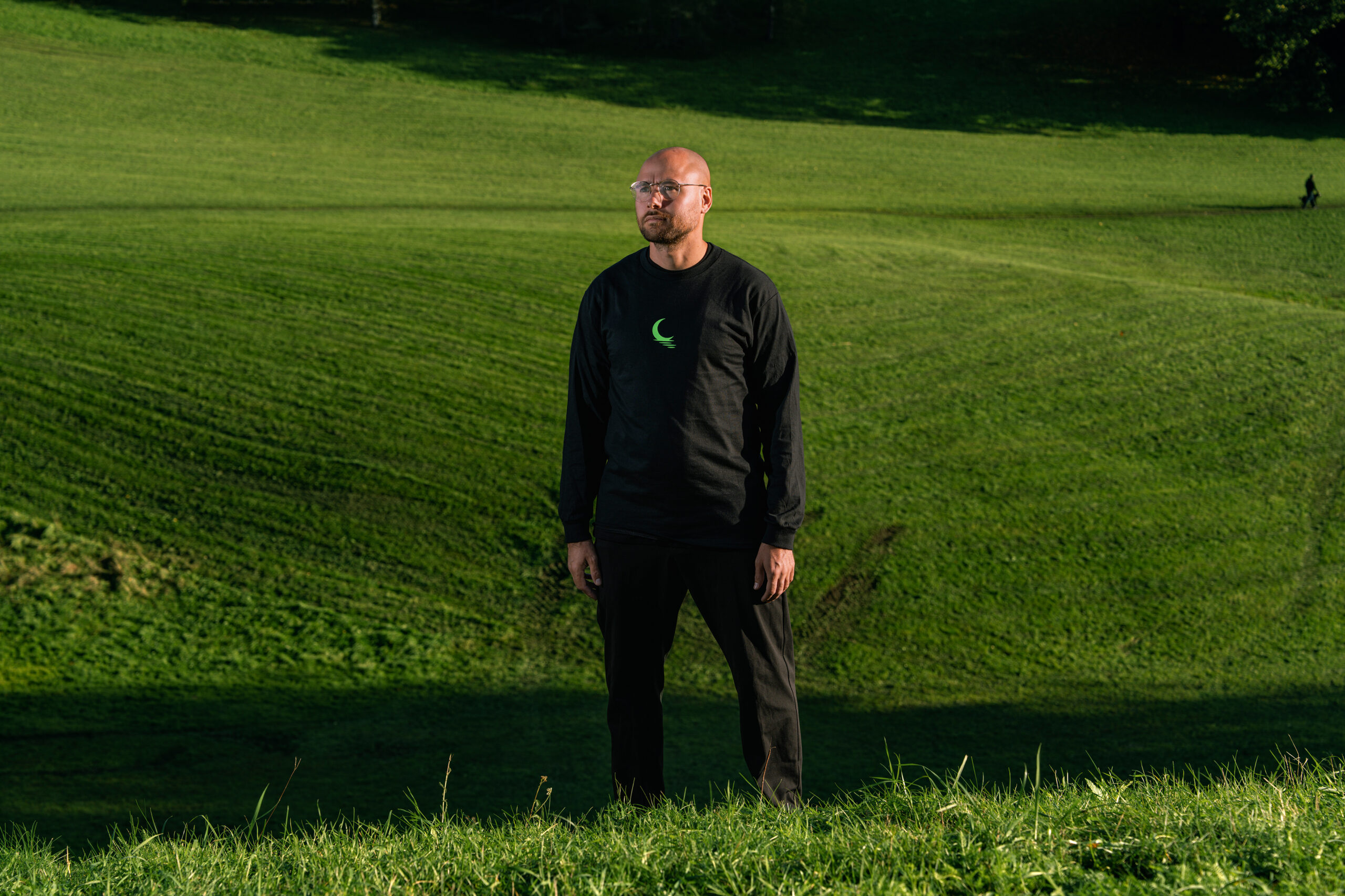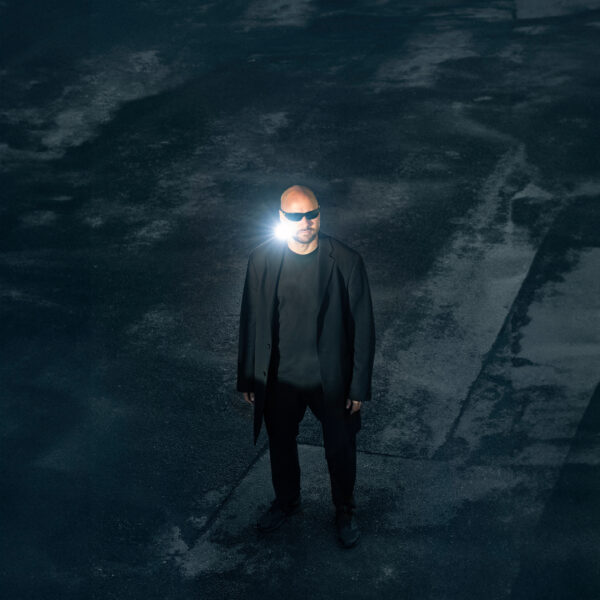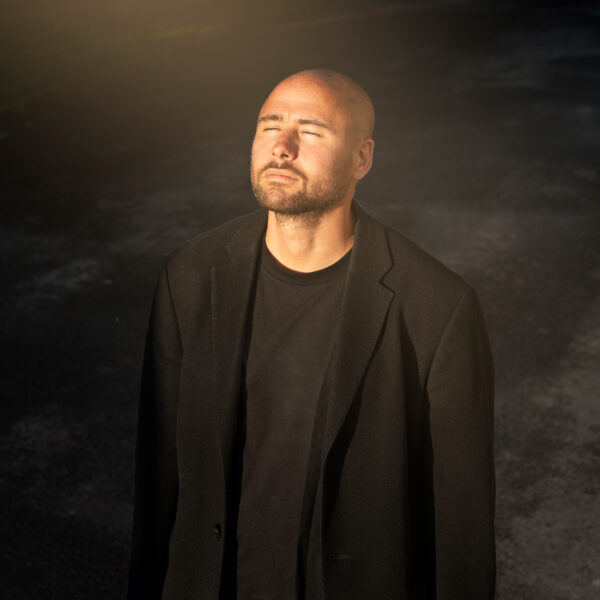From Kids Love Bass to Mr Promising Start, Seth Raknes talks to us about his latest project and how he got there ahead of his set this Friday.
Seth Raknes has never been one to label easily. When he came here to perform his debut LP as Mr Promising Start last year, I was expecting something of that UK bass sound with which we’ve associated him and his time at Kids Love Bass. Instead we were taken down a wormhole of cinematic abstraction towards a kinetic creative identity.
“I wish I was better at this“ is an album of deep introversion, drowning in a miasma of lush electronic textures rooted in the lower ends of the frequency spectrum. On Jaeger’s sound system it droned and intimidated with Seth’s vocals growling at you through distorting machines. Playing on a backdrop of video as abstract as the music, it draws the listener/viewer close to the artist.
At some point and unprompted, the entire audience sat down on the floor, like they’re listening to an old friend talk about a recent journey, and that is what it felt like; it’s an album that takes you on a trip towards Seth Raknes most inner creative soul.
“I wish I was better at this“ is the latest evolution of an artist and DJ that was been deeply intertwined in the fabric of Oslo and Norwegian club culture, and while it marks a departure from the DJ booth, I found that it still maintains that immutable tether to club music and that club sound.
Seth lives in Barcelona today, but he continues to make regular visits to Oslo, and with his newly established label Lauguna Luminosa, it looks like we’ll be seeing a lot more of him in the coming future with more releases primed. His next stop will be at Jaeger, opening up for Todd Edwards and with another release shortly on its way, we called him up to find out more about his future, his past and his journey to Mr Promising Start.
The last time you were at Jaeger you presented your debut LP. Was this your debut as both Mr Promising Start and Seth Raknes? Because I can’t believe with your history that you hadn’t released anything before.
That’s my first full release under any nickname or alias. I’ve had some obscure remixes, but this is my first original work.
I know it took you six years to record and finish it. Was there something from the outset that planted the seed for this project?
It was a mix of everything. I dabbled in different sounds before landing on anything. For this particular project, I decided on the name and the vision I had at the same time. It was in 2016, and I was living in Bergen at the same time.
I came back to Oslo, and went into the studio. I made a bunch of sketches, which were just instrumentals, but I had already decided I wanted to record vocals on them. I went to Roland (Filter Musikk) and got some tips on recording techniques. Then I moved to Barcelona and the project was put on ice.
It took a long time to finish it. I kept moulding it and working it. I sent it out, but in the end a few people pushed me to release it myself, and it took another year to set up my own label.
You mentioned that you had this vision for a sound in your head before you even started it. What exactly was that idea?
I’m still trying to put it into words, because part of it is a subjective feeling and image. I have this sense of colour and atmosphere when I think about what I want things to sound like.
To be more specific; I wanted to make electronic music that wasn’t really locked into one particular grid or genre. In a similar way to how I DJ; influenced by the different styles and tempos.
I wanted to have vocals on it, to separate it from whatever else is out there, and I like writing lyrics, but I don’t have a voice that can sing. I was pre-determined to process the vocals to fit into an electronic landscape.
When you talk about writing lyrics, were there any particular lyrical themes running through the album?
Yes, I had a theme to it and a style that probably comes from rap music as a reference. I also made it with the mantra that I didn’t want to overthink it, so sometimes it’s close to gibberish. I try to focus more on keeping the flow against the backdrop of electronic music where there is a lot of mathematics.
There is a lot of my self-deprecating humour around anything from anxiety and depression to more light-hearted stuff. There’s a whole song there called “customer-service” about how people come to talk to you in the booth while you DJ.
I wrote that during the peak of the pandemic, and I hadn’t done a DJ gig in ages and it’s me reflecting on how nice it is to not have to deal with certain aspects of Djing, like people ordering a drink from you. Overall, there’s a sense of humour in everything.
Between the lyrics, the sound, the visual aspects like the video, and the performance of the LP; Was it always the intention to create this sprawling multimedia project?
It wasn’t the idea from the beginning. It goes back to your previous question; when you asked what the vision was. I am particularly inspired by audio visual stuff and film in general. A lot of the songs on the album have references from movies or series, which captures these moods and references the lyrics. There’s always an image present when I work on music.
There was never an idea to create visuals for it, but that happened when I started working on the art direction with my good friend, Eivind Sillah-Guttuhaugen (one more thing). He said; “you should do a music video.”
When I started working on the music video together with director Vi Duc Truong I had this idea for an intro piece for the music video and then the ball started rolling. I do this a lot when I’m up late and I can’t sleep due to insomnia. My brain started churning and I thought it would be cool to have some simple visuals going for the entire album, during that listening party at Jaeger.
It turned into a short film. I forced my friend Gustav Tønnesen to help me film the thing in Barcelona.
Talking about the intro, it sees you skateboarding around Barcelona, and while doing some research for this I found an article with an 18-year-old Seth Raknes on skateboarding. Music and skateboarding have always had this symbiotic relationship, and skate videos have always impressed this kind of narrative through the music. Is that something that influenced you with the creation of this LP?
On the musical side it has very little influence. I wasn’t even skateboarding at the time when I started the album. It was more prevalent on the visual part, and that was on purpose, because that aesthetic is part of my identity. Especially with those VX cameras that we used and the format. I also went through the skateboard world when finding people to help out.
I have a bit of a complex relationship with skateboarding. I like skating, and I like the things it has given me, but I don’t like labelling myself as a skater for various reasons. When it came to the visual aspect however, it totally made sense to include that in there.
Did your relationship with music and DJing start through skating, or have you always tried to separate those two parts of your identity?
I wouldn’t say I separated them. If anything, I think music took me away from skating. I was more into skating in my teens and then in my late teens l found I couldn’t really identify with skating.
The music genres that most of the skaters I knew listened at that time, wasn’t the music I was interested in. I started going away from rap and things that I had listened to in my teens and getting more and more interested in electronic music.
Most of the people that I was skating with were in either one of two camps; rap and mainly boom bap or guitar music. And then you had two clothing styles based on that, and that was just too segregated for me. I never really cared what others were doing, I just did my own shit.
*photos by Christian Tung
Was it Djing that piqued your interest initially when it came to electronic music?
It started with Djing. I wanted to work with music, but I couldn’t find my place. I was working at a local skate shop in my late teens and I would burn CDs to make mixtapes for the store. People would come in and ask what these CDs were, and people wanted to buy them or make mixtapes for them.
At the same time I started going out and I would hear a lot of the same songs at parties, and I thought; “maybe Djing is my calling”. I wanted to work with music, but I didn’t have any talents. I could write raps, but I couldn’t physically do them and I dabbled in music production, but couldn’t play any instruments.
At the time there was a label called Pass It records at the forefront of Hip Hop and I knew a lot of people involved in that and one of the people in that group was Daniel Gude. I approached him and asked; “how do I start Djing.” I also asked William “Nasty Kutz” Wiik Larsen (DMC champion/ super-producer) to show me some basics and I practised. I threw my first party at Blå, calling on a favour and twenty people came and I lost a lot of money.
Not too long after I started playing with Daniel as Kids Love Bass.
And the rest is history…I just want to come back to the mixtapes. Who or what was informing your listening habits and helping you find the music for these mixtapes?
It was the Internet. In the early stages, I was going to music blogs and using limewire. A little bit later, when it came to electronic music, I started listening to Internet radio stations and I was kind of in the middle of that blog House era.
DJs like Diplo were crossing genres between rap and electronic music, which made sense to me as well as Grime and UK club music. On the other side, being a DJ in Oslo you learn more about House and Techno, being such a small scene and with Daniel being my partner and his huge collection of music, you also find out everything from Disco to Boogie.
I know you’ve never been one to be pigeonholed in terms of what you play, but is there anything like a sound that you look for in music you play or buy?
The easiest way to sum it up, would be to look at what was going on in London in that era. Particularly that Plastic People, Rinse FM thing where dubstep and garage started crossing paths with darker Techno and House. You would hear wobbly basses on a House or Techno track. With Kids Love Bass it was the same thing and we had a preference for things that came out of that world.
Colloquially in London it was being referred to as future bass, purely for lack of any definitive term.
Yeah it was a weird time. Still to this day, it’s a little unclear. It was called post-dubstep, future bass and then there was UK Funky that was part of that, but they had their own label on it.
That classic question of “what do you play or what do you make”… as soon as I started Djing, I haven’t been able to respond to that with a simple answer and I still can’t. (Laughs)
Did you find, like me, that a lot of the artists and DJs that came out of that era, that were bridging all those genres and styles, eventually moved into more traditional styles and became very conventional Techno or House artists.
Yes, definitely. There were some names that I feel faded away and got lost in the sauce, but I can also understand that. It’s hard to find your footing. They would make one song that sounded more Housy and they would get booked to a party and drop a dancehall track, which would empty the floor, because people were just there for that one House song.
Now you see artists coming back to it, like L-Vis 1990.
That’s the same with your album. It harks back to that creative melting pot of that era.
The interesting thing is; I made that album thinking I would appeal to that type of “Bass” crowd, but when I dropped the album the people supporting it were coming from more typical backgrounds, people like Laurent Garnier or Joris Voorn.
Were you thinking of the dance floor, the DJs and the club setting when you were making this album?
Everything I make is shaped to sound good on a club system, but no it wasn’t made to fit into a DJ set. It’s club music, but made to listen to at home. With all the elements, and the details, it’s not that stripped down, I totally understand that it wasn’t picked up by DJs and used in the club context. It wasn’t intended to go down at peak hour in Berghain.
And you can’t make an album for that either.
For sure, and I took out tracks for that reason too.
Will those tracks make it onto a future EP or LP?
I don’t think so, I’m done with this process for the most part. What I will probably do is a few tracks as instrumentals and some remixes.
Is that why you set up the label too, as an exclusive vehicle for your future releases?
I think it’s mainly for me. I wouldn’t mind doing something for someone in the long-term future. But it’s so much work and I don’t feel like I can be responsible for other people, for now. It’s mainly for me. I have a ton of music laying around and I have more ideas for other projects.
So it’s only the beginning?
Yeah. I’m in the process of the second release, which is an EP dropping on June 21st. The EP is called “monetize your soul.” This time I’m trying to get into the club. I’m dropping it to try to get into the festival circuit, hence the title; I’m trying to sell-out with a smirk. There are some inside jokes about trying to please crowds and following certain trends. I picked the songs because they fit that mould, but I made the songs just trying to have fun and see what works for DJs.
I have a lead track called “waffle of the week;” it’s about time I made a waffle anthem. It’s a straight up House track with a little bit of UK Funky and UKG references. It has some cooking sounds sampled in there too. I’m making a video for it, and I will drop that track exclusively on bandcamp on the 7th of June, when the party is going down with Todd Edwards.
And I imagine that waffle of the week will make it into your set on that night.
I will for sure play that track and a few more from the EP. So if you want to hear it on a good system and you’re in Oslo on June 7th, you know where to be.



